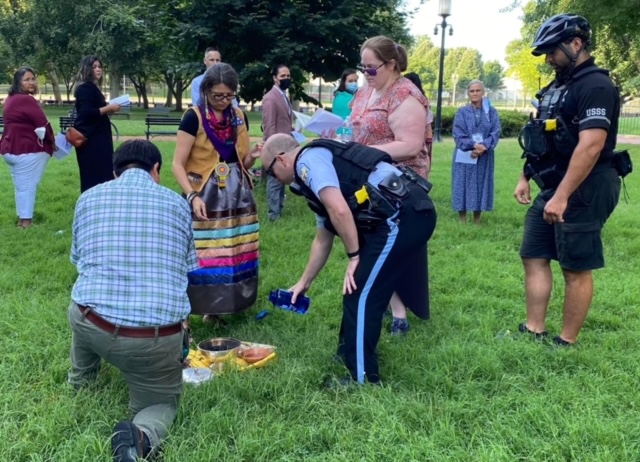
- Details
- By Neely Bardwell
During the last weekend in July, U.S. Park Police disturbed and interrupted an induction ceremony for the Association of American Indian Physicians (AAIP) in Lafayette Square, Washington D.C.
On Saturday, approximately 30 physicians gathered in Lafayette Square to perform an Initiation ceremony for new physicians. This ceremony typically happens every year for the last 50 years, but because of Covid, they haven't been able to hold an Initiation ceremony since before the pandemic.
The ceremony includes smudging, prayer, and this year, a small sacred fire. The fire was built in an urn made specifically for this purpose.
Lafayette Park is located directly in front of the White House. Because of this, AAIP made sure to speak with the Secret Service at the White House Gate to see if they needed any permits or if there were any rules. They were told they “could do anything [they] want in Lafayette Park.”
Under the impression that they had the all-clear, they proceeded with the ceremony.
“As we were carrying out our process, I would say we were about halfway through when a police vehicle I could see out of the corner of my eye was driving up and then two individuals, walked up very quickly, and aggressively towards the center of the space,” Allison Kelliher, MD (Koyukon Athabascan, Dena), secretary for AAIP, recounted. One of the officers demanded that Kelliher put out the fire.
“He yelled abruptly that we put out the fire. I suggested that I put the lid on the urn and he said that I needed to put water on. So, I poured water on this sacred fire and put it out and then he looked at the smudge pot next to it which barely had any burning embers and asked me to pour that out. And so I did. He hastily took the water bottle out of my hand and then double poured extra water on the fire.”
Terry Maresca, MD (Mohawk), long term member and former president of AAIP, describes the emotions after the intrusion.
“I think what was going through my mind was more of just flashbacks of trauma and not just our own, but flashbacks of other people. This kind of intrusiveness and inappropriate policing and inappropriate exercise of authority without any respect or any kind of curiosity inquiry. There could have been a lot of other ways to have handled this particular situation.”
The group was able to finish the ceremony despite the sacred fire and smudge pot being put out.
“We were able to kind of regroup ourselves to understand that we really are that fire. We are the continuation. So long as we're breathing, we are that fire,” explained Matesca. “So I think it was a real spiritual exercise in a traumatic way.”
AAIP has expressed the need for a formal apology from the Park Police.
The United States Park Police District One Central Police Station declined to comment on the situation.
More Stories Like This
Native News Weekly (August 25, 2024): D.C. BriefsDeb Haaland Earns Endorsement From Communications Workers of America Local 7076
University Soccer Standout Leads by Example
Two Native Americans Named to Democratic Congressional Campaign Committee's“Red to Blue” Program
Cheyenne River Youth Project Hosts Young Women’s Winter Camp as Part of Lakota Culture Internship
Help us defend tribal sovereignty.
At Native News Online, our mission is rooted in telling the stories that strengthen sovereignty and uplift Indigenous voices — not just at year’s end, but every single day.
Because of your generosity last year, we were able to keep our reporters on the ground in tribal communities, at national gatherings and in the halls of Congress — covering the issues that matter most to Indian Country: sovereignty, culture, education, health and economic opportunity.
That support sustained us through a tough year in 2025. Now, as we look to the year ahead, we need your help right now to ensure warrior journalism remains strong — reporting that defends tribal sovereignty, amplifies Native truth, and holds power accountable.
 The stakes couldn't be higher. Your support keeps Native voices heard, Native stories told and Native sovereignty defended.
The stakes couldn't be higher. Your support keeps Native voices heard, Native stories told and Native sovereignty defended.
Stand with Warrior Journalism today.
Levi Rickert (Potawatomi), Editor & Publisher

